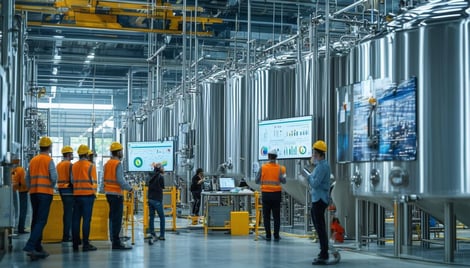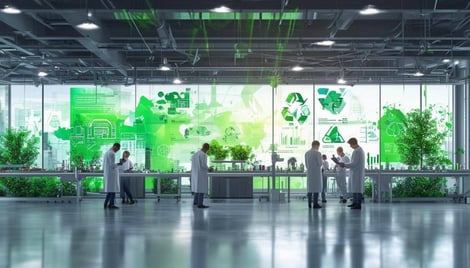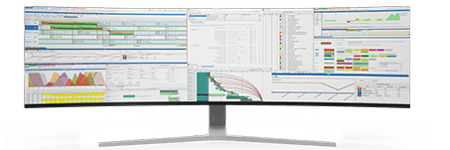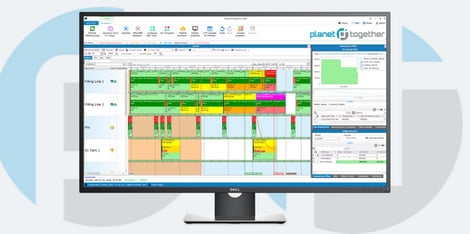Strategic and Sustainable Sourcing in Chemical Manufacturing
As global demand for chemical products grows, supply chain managers in chemical manufacturing facilities face unique challenges. The complexity of sourcing raw materials, stringent environmental regulations, and the volatile nature of chemical markets all demand a strategic and sustainable approach. This shift is not merely about maintaining profitability but about achieving long-term resilience and compliance.
One powerful enabler of this transformation is integrating advanced production scheduling and supply chain optimization tools like PlanetTogether with enterprise systems such as SAP, Oracle, Microsoft Dynamics, Kinaxis, or Aveva. This integration drives a smarter, more sustainable approach to sourcing while optimizing supply chain performance.
In this blog, we’ll explore how strategic and sustainable sourcing is redefining chemical supply chains, and how integrating these technologies offers a competitive advantage.

The Case for Strategic Sourcing in Chemical Manufacturing
Strategic sourcing involves creating long-term partnerships with suppliers and optimizing the procurement process to reduce costs, mitigate risks, and improve quality. In chemical manufacturing, this process is crucial because:
Material Complexity: Chemicals often require rare or highly specific raw materials, and supply disruptions can severely impact production.
Environmental Regulations: Manufacturers must comply with increasingly stringent environmental laws, which demand sourcing from sustainable suppliers.
Cost Sensitivity: Volatility in raw material prices affects profitability, necessitating a cost-effective sourcing strategy.
While traditional sourcing strategies focus on short-term gains, strategic sourcing aligns procurement with the organization’s broader goals, including sustainability and resilience.

The Shift Toward Sustainability in Chemical Sourcing
Sustainability is no longer optional for chemical manufacturers. With increasing scrutiny from regulators, customers, and investors, manufacturers are adopting sustainable sourcing practices such as:
Eco-friendly Materials: Sourcing raw materials that have a lower environmental impact.
Supplier Audits: Ensuring suppliers adhere to environmental, social, and governance (ESG) standards.
Circular Economy Practices: Partnering with suppliers to use recycled or renewable inputs.
The challenge lies in balancing these sustainability goals with operational efficiency and cost optimization. This is where advanced integration between tools like PlanetTogether and ERP systems comes into play.
![]()

PlanetTogether and ERP Integration: A Game-Changer
The Role of PlanetTogether
PlanetTogether offers advanced production scheduling and planning capabilities that streamline supply chain operations, enabling chemical manufacturers to optimize resources, reduce waste, and meet delivery timelines.
Integration with ERP Systems
When PlanetTogether integrates with ERP systems like SAP, Oracle, Microsoft Dynamics, Kinaxis, or Aveva, it unlocks unparalleled visibility and control across the supply chain. This integration provides:
Real-time Data Flow: Seamless sharing of demand forecasts, inventory levels, and supplier performance metrics ensures data-driven decision-making.
Enhanced Collaboration: Integration fosters better communication between sourcing, production, and logistics teams, reducing silos.
Predictive Analytics: Combined data insights from PlanetTogether and ERP systems allow supply chain managers to anticipate risks and optimize procurement.
For instance, by leveraging the forecasting capabilities of SAP or Oracle, and aligning them with PlanetTogether’s production schedules, manufacturers can ensure that raw materials are sourced just in time, reducing inventory costs while maintaining production continuity.

Key Benefits of Strategic and Sustainable Sourcing with Integrated Systems
1. Improved Supplier Selection
Integration enables manufacturers to evaluate suppliers not just on cost but on their sustainability credentials. PlanetTogether’s tools can analyze data from ERPs like Kinaxis to prioritize suppliers who meet ESG criteria, aligning procurement with sustainability goals.
2. Reduced Costs and Waste
PlanetTogether’s optimization algorithms identify inefficiencies in the supply chain, such as over-ordering or suboptimal transportation routes. These insights, combined with ERP data, help in negotiating better contracts with suppliers, reducing both costs and environmental impact.
3. Enhanced Risk Mitigation
In a volatile market, risk mitigation is critical. By integrating PlanetTogether with Aveva or Microsoft Dynamics, supply chain managers can create contingency plans based on real-time data. For example, if a key supplier faces disruptions, the system can recommend alternative suppliers or adjust production schedules accordingly.
4. Transparency and Traceability
Integration ensures end-to-end visibility of the supply chain. From sourcing raw materials to delivering finished products, manufacturers can track their environmental footprint and provide transparent reports to stakeholders.

Overcoming Challenges in Implementation
While the benefits of integrating PlanetTogether with ERP systems are clear, the implementation process can be complex. Here’s how to address common challenges:
1. Data Integration
Merging data from multiple systems requires careful planning. Using middleware or APIs can simplify this process, ensuring smooth data flow between PlanetTogether and ERP systems like Oracle or Kinaxis.
2. Change Management
Adopting new tools requires buy-in from all stakeholders. Training sessions and clear communication about the benefits of integration can drive adoption.
3. Customization
Every chemical manufacturer has unique needs. Customizing the integration to align with specific processes, such as hazardous material handling or regulatory compliance, ensures maximum ROI.
Looking Ahead: The Future of Sourcing in Chemical Manufacturing
The future of sourcing in chemical manufacturing will be shaped by technology and sustainability. As tools like PlanetTogether evolve, their integration with ERP systems will unlock even greater efficiencies, including:
AI-Driven Supplier Recommendations: Advanced algorithms will recommend suppliers based on cost, sustainability, and risk profiles.
Blockchain for Traceability: Ensuring that every raw material can be traced back to its origin, enhancing transparency.
Collaborative Platforms: Manufacturers and suppliers will collaborate in real-time, sharing data to optimize the entire supply chain.
Strategic and sustainable sourcing is no longer a competitive advantage but a necessity in chemical manufacturing. By integrating advanced tools like PlanetTogether with robust ERP systems such as SAP, Oracle, Microsoft Dynamics, Kinaxis, or Aveva, supply chain managers can achieve a delicate balance between operational efficiency and sustainability.
This integration empowers manufacturers to build resilient, eco-conscious supply chains that are equipped to thrive in a rapidly changing market. For supply chain managers, the message is clear: the future lies in embracing technology and sustainability to unlock new levels of performance and responsibility.
Are you ready to take your manufacturing operations to the next level? Contact us today to learn more about how PlanetTogether and integrated scheduling solutions can help you achieve your sustainability goals and drive success in the chemical industry.
Topics: PlanetTogether Software, Integrating PlanetTogether, Transparency and Traceability, Reduced Costs and Waste, Chemical Manufacturing, Enhanced Risk Mitigation, Improved Supplier Selection





















LEAVE A COMMENT